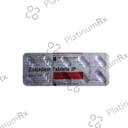Zolpidem
Uses
Zolpidem is used in the treatment of insomnia.
How it Works
How Zolpidem works Zolpidem belongs to a group of medications known as non-benzodiazepine hypnotics. It has hypnotic, sedative, and anticonvulsant properties. It works by binding to the GABAA receptor chloride channel macromolecular complex, a chemical messenger that slows the activity of nerve cells in the brain and aids in falling asleep.
Side Effects
Common side effects of Zolpidem include dizziness, sleepiness, diarrhea, and drowsiness.
Expert Advice
- Your doctor has prescribed Zolpidem to help you fall asleep faster and sleep for longer.
- It is best taken without food, as a high-fat meal can reduce its absorption and effectiveness.
- Take it 30 to 45 minutes before bedtime and only when you have time to sleep for at least 7 hours.
- It may cause dizziness the next morning; avoid driving or performing tasks requiring concentration until you know how it affects you.
- Zolpidem does not affect total sleep time; however, it reduces sleep onset time and the frequency of awakenings at night.
- Never share your medication with anyone else who has a sleep problem.
- Inform your doctor if your sleep does not improve after 7 to 10 days of treatment.
- Stop taking the medication and inform your doctor if you experience sleep driving or memory loss.
- Do not stop taking the medication suddenly, as this may lead to anxiety, mood changes, and restlessness.
- Inform your doctor if you are on depression medication while starting treatment with Zolpidem.
Other Combinations
Melatonin + Zolpidem
Related Medications
Zolpidem 10mg

MRP ₹136.4
Zolpidem 10mg

MRP ₹72
Zolpidem 10mg

MRP ₹9
Zolpidem 5mg

MRP ₹40
Zolpidem 10mg

MRP ₹58.5
Zolpidem 10mg

MRP ₹95
Zolpidem 12.5mg

MRP ₹87.8
Zolpidem 10mg

MRP ₹85
Zolpidem 5mg

MRP ₹38
Zolpidem 6.25mg

MRP ₹69
Zolpidem 5mg

MRP ₹48.7
Zolpidem 1mg

MRP ₹44.5
Zolpidem 10mg

MRP ₹66
Zolpidem 5mg

MRP ₹54.5
Zolpidem 5mg

MRP ₹39
Zolpidem 10mg

MRP ₹62.9
Zolpidem 10mg

MRP ₹83.3
Zolpidem 10mg

MRP ₹85
Zolpidem 5mg

MRP ₹93.1
Zolpidem 5mg

MRP ₹40.5
Zolpidem 10mg

MRP ₹70
Zolpidem 10mg

MRP ₹60
Zolpidem 10mg

MRP ₹57
Zolpidem 10mg

MRP ₹14.6
Zolpidem 10mg

MRP ₹105
Flat ₹100 off on first app order | Use Code: APP100 |
Flat ₹100 off on first app order
USE CODE: APP100

Download Now